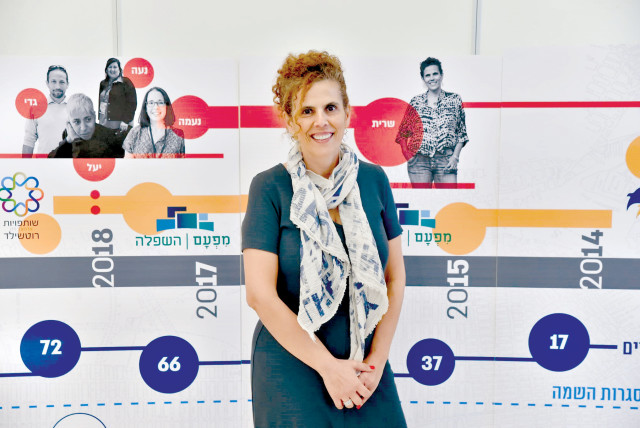Hamas war nearly destroyed their businesses. Emergency loans saved them

SparkIL announced the launch of a NIS 10 million ($2.8 million) Emergency Loan Fund that provides small businesses affected by the war with up to NIS 100,000 ($28,000) in assistance per business.
Sarit Tabib Milman, an organizational consultant for the nonprofit and the public sector, was set to start four projects prior to the onset of the Israel-Hamas war. She also had ongoing retainer agreements with two organizations. But October 7 changed everything.
“I found myself after October 7 with almost nothing in my hand,” Milman said. “The magnitude of everything was overwhelming.”
She added, “My business was growing for years, and then in a moment it felt like it was all gone.”
Since she works with municipalities and government offices, Milman said she knew that her business, called Konnected, “would be stuck for months” due to the war. However, she decided that “instead of being stressed, I’d ask for help.”
Indeed, help arrived from SparkIL, a peer-to-peer lending platform that enables individuals across the Jewish world to support the small business of their choice in Israel. In December, SparkIL announced the launch of a NIS 10 million ($2.8 million) Emergency Loan Fund that provides small businesses affected by the war with up to NIS 100,000 ($28,000) in assistance per business.
Milman said the emergency loan enabled her to continue paying the bills and “also gave me time to think about the next steps — how I could self-promote and determine ways to revitalize the business when it’s back.”
Cultivating Israel-Diaspora unity
SparkIL and its Emergency Loan Fund also foster meaningful relationships between lenders in the Diaspora and the small business owners whom they are supporting in Israel at a time when it is more critical than ever.
“Around the world at a time like this, it is common for the typical supporter of Israel to ask, ‘How can I help?’ SparkIL has always offered a unique opportunity in that realm, and today that resonates more powerfully than ever,” said Na’ama Ore, CEO of SparkIL. “With small business owners hurting, these loans transform Israelis’ hurt and pain into hope.”
World Jewry’s participation in funding the SparkIL loans cultivates a sense of unity that is not lost on Milman.
“We’re all one living soul,” Milman said of the Jewish people. “We’re unified. And the feeling that we’re not alone, that someone else cares, is so critical. The situation is so hard now, so we need to keep the unity of our people and hold on to it tightly. It’s so beautiful. Each person has a warm place in my heart.”
That message resonated strongly with business owner Ana Mazaresky, founder and CEO of pitchUP Startup Fundraising. Mazaresky, who made aliyah from Russia 31 years ago when she was a child, is grateful that her loan was made possible by contributions from Jews from around the globe.
“The fact that the Jewish people around the world care about us in Israel shows we’re all in this together. Everybody is part of the Israeli experience here even, if you don’t have family in the North or South. We all are connected here, and it’s really incredible that Jews worldwide want to support that,” she said.
Mazaresky, who specializes in coaching start-ups as they go through the fundraising phase of starting their company, considered asking for a loan even before the war started, as she wanted to expand her business. Once the war broke out, though, she saw a significant slowdown in work. Instead of panicking, she decided to move forward with her plans to ask for a loan and turned to the social lending enterprise Ogen, which put her in touch with SparkIL.
Thanks to the money she received, she was able to spend the first two months of the war taking care of her family without worrying about the next paycheck.
“I ended up not needing money to expand, but to live. One of my clients dropped me. For a month and a half, I couldn’t do any marketing or writing because I was so emotionally devastated. So instead, I immersed myself in my kids and family. I was a full-time mom, focused on them to keep me sane,” she said.
Echoes of the COVID-19 crisis
For Sarah Amsallem, a health coach based in Tel Aviv who made aliyah from France, the war evoked memories of the climate for small businesses during the early stages of the COVID-19 pandemic. At the time, Amsallem halted her work as a personal trainer and focused exclusively on the nutrition side of her business, which caused her to lose a significant portion of her clients.
This time around, receiving a wartime loan from SparkIL helped Amsallem maintain a focus not only on the present but also on the future of her business.
“I’ve worked hard to develop my business, and I want it to grow,” she said. “I now have funds to boost communication efforts and purchase new equipment.”
COVID-19 taught Milman that the Israeli government alone does not have the capacity to provide the full extent of assistance that small businesses require during an economic crisis.
“Many of us needed to reinvent ourselves during COVID, and now many of us need to do so again,” she said. “We don’t really have a safety net.”
Today, Israel’s small businesses are experiencing a severe personnel shortage, given the 360,000 reservists called up by the Israel Defense Forces, while many businesses in industries such as tourism have been closed or have pivoted to tending to the needs of evacuees. With the Israeli government offering an insufficient grant to small businesses affected by the war, the SparkIL Emergency Loan Fund is substantially increasing the assistance that is available to those businesses at this time.
“Our goal is to provide the victims of the war and of the economic crisis with immediate assistance, particularly through a quick and seamless process with minimal bureaucracy,” said Sagi Balasha, CEO of The Ogen Group, one of SparkIL’s founding partners along with The Jewish Agency for Israel.
The road ahead
In the long run, the war’s economic toll could be severe. Estimates from the Bank of Israel forecast the war to cost Israel roughly $53 billion between now and 2025, while JPMorgan Chase & Co. predicts that Israel’s gross domestic product will shrink 11% this quarter on an annualized basis.
However, small business owners like Milman are remaining cautiously optimistic.
“I’m so grateful that people are still looking for me and want my services, but it’s tough,” she said.
Meanwhile, as Israelis continue to navigate the economic challenges of wartime, SparkIL’s Emergency Loan Fund stands ready to channel the power of Jewish unity for the purpose of providing a lifeline to businesses across the country that are affected by the war.
“SparkIL helps put the mutual responsibility the Jewish people have for one another into action,” said Amira Ahronoviz, CEO and director-general at The Jewish Agency for Israel. “The loans granted by SparkIL will help small businesses and nonprofit organizations in Israel survive this challenging period and allow supporters around the world to connect with Israel in a meaningful and impactful way.” ■
Jerusalem Post Store
`; document.getElementById("linkPremium").innerHTML = cont; var divWithLink = document.getElementById("premium-link"); if (divWithLink !== null && divWithLink !== 'undefined') { divWithLink.style.border = "solid 1px #cb0f3e"; divWithLink.style.textAlign = "center"; divWithLink.style.marginBottom = "15px"; divWithLink.style.marginTop = "15px"; divWithLink.style.width = "100%"; divWithLink.style.backgroundColor = "#122952"; divWithLink.style.color = "#ffffff"; divWithLink.style.lineHeight = "1.5"; } } (function (v, i) { });


